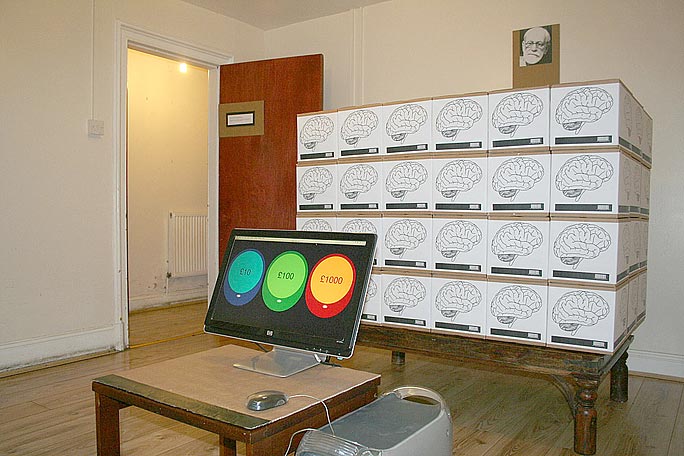
FLEXIBLE FREUD
[Father Of Retail Therapy] 2013
Cardboard boxes, cardboard, interactive computer animation
[Father Of Retail Therapy] 2013
Cardboard boxes, cardboard, interactive computer animation

Brains for sale

Mr Freud

The animation
FLEXIBLE FREUD [ Father of Retail Therapy ] was an installation designed in response to a theme set for the Sydenham Arts Festival 2013. The theme was: 'Retail Therapy'.
As it might be known, Retail therapy means shopping to improve one's mood. It would sound as though, by buying goods, one would also buy one's cheerfulness. Should, therefore, mood be regarded as a commodity rather than an emotion?
The title of the installation combines the colloquial name for the credit card--flexible friend-- and the name of father of psychology, Sigmund Freud. Here, likened to the period of validity of a credit card, the life of Mr Freud is marked by a start date and an expiry date--the months and years of his birth and death.
A monolit of boxes is a tangible presence in the space. Many brains stacked up and ready to replace people's current ones with a vew to benefiting them with a better mood. The brains are all associated with a barcode, the ultimate symbol of trading.
An animation further explore the concept of mood's commodification by presenting the audience with a mysteryous chance to spend some money. While it is not clear on what sort of items the money would be spent, the customer-viewer can determine how much they will spend: £10, £100, £1000. As the choice is made, the button pushed, the money cashed (this signalled by a sonorous till sound) the item purchased is revealed: a smile. £10 will buy the viewer a short spell of cherfulness time, £100 a medium length's cheerfulness time and a £1000 a longer one. However, inevitably, after the time is gone by the smile turns to a sour expression.
As the smile leaves the face on the screen, a reflection lingers on: would life be easier and more manageable if one could really buy mood off the shelf?
As it might be known, Retail therapy means shopping to improve one's mood. It would sound as though, by buying goods, one would also buy one's cheerfulness. Should, therefore, mood be regarded as a commodity rather than an emotion?
The title of the installation combines the colloquial name for the credit card--flexible friend-- and the name of father of psychology, Sigmund Freud. Here, likened to the period of validity of a credit card, the life of Mr Freud is marked by a start date and an expiry date--the months and years of his birth and death.
A monolit of boxes is a tangible presence in the space. Many brains stacked up and ready to replace people's current ones with a vew to benefiting them with a better mood. The brains are all associated with a barcode, the ultimate symbol of trading.
An animation further explore the concept of mood's commodification by presenting the audience with a mysteryous chance to spend some money. While it is not clear on what sort of items the money would be spent, the customer-viewer can determine how much they will spend: £10, £100, £1000. As the choice is made, the button pushed, the money cashed (this signalled by a sonorous till sound) the item purchased is revealed: a smile. £10 will buy the viewer a short spell of cherfulness time, £100 a medium length's cheerfulness time and a £1000 a longer one. However, inevitably, after the time is gone by the smile turns to a sour expression.
As the smile leaves the face on the screen, a reflection lingers on: would life be easier and more manageable if one could really buy mood off the shelf?